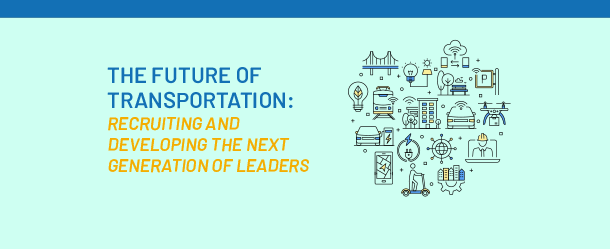



I’ve seen the transportation industry change dramatically in my nearly three decades with MBP. From the evolving use of technology to a shifting workforce landscape, our industry now faces one of the most challenging times in terms of workforce recruitment and development. Here are my thoughts on some of the industry’s biggest questions what the industry needs to do to adapt:

Undoubtedly, the biggest challenge right now is people—specifically, having enough trained professionals who want to do this type of work. Finding a qualified workforce is challenging, whether it’s contractors, designers, or construction management firms like ours.
This workforce shortage is linked to overall population demographics. Baby boomers, who have been the backbone of the industry for years, are retiring in larger numbers, leaving a gap in the workforce. Generation X is a smaller population in comparison, and younger generations may not find careers in transportation as attractive. There’s a societal push towards certain career paths, which can overshadow the rewarding opportunities available in the transportation construction industry.
While there’s often an emphasis on college education for young people today, the transportation industry offers rewarding roles for both degree holders and those without. We need both, and there are robust training and apprenticeship programs available for those who want to develop knowledge and skills in a more hands-on environment.
New technologies, like GPS, reality capture with 360-degree cameras, drones, and advanced construction techniques, make it an exciting, high-tech field. However, the perception of the industry still suffers from outdated stereotypes, such as the cliché of road workers “leaning on a shovel.” We need to correct that image and attract more talent to meet the growing demand.

Technology has already dramatically reshaped the skill set required compared to as recently as 10 years ago. Today, there’s a much higher emphasis on digital proficiency. Everyone is using tablets and workers need to adapt quickly to new software. The ability to learn and master new technologies rapidly is crucial.
On the technical side, the use of GPS for equipment operators has advanced significantly. Where we once relied on manual processes like setting survey stakes, now much of this is handled through GPS and automated systems, increasing efficiency.
However, even with all the advancements, there’s still no substitute for human oversight. Decisions and problem-solving in the field remain critical since not everything can be predicted.
Communication is highly important. The best construction managers are those who balance both—being proficient in technology while also being effective communicators. Without both sets of skills, success in transportation construction management can be limited.

The most critical skills for new talent start with strong communication skills, curiosity, and adaptability. Foundational skills like math, writing, and the ability to read and visualize plans are important, although new technologies such as 3D renderings are transforming how professionals approach these tasks. The ability to review schedules and assess project timelines is another key competency.
Attracting talent from non-traditional backgrounds requires employers to keep an open mind. At MBP, we’ve had success by focusing on traits like willingness to learn, teamwork, and strong communication skills. These allow us to hire individuals who may not have the traditional AEC Industry background but are eager to develop their skills. For people without college degrees, there’s ample room and opportunity for them to advance as well.
A lot of this success stems from creating a supportive environment. Teamwork is central as well as offering a robust benefits package to help employees thrive. This includes tuition reimbursement and student loan repayment options, providing team members with the chance to further their education or pay off existing student loans. Professional development to include training for both emerging leaders and executives, mentoring and apprenticeship, ensure continuous career growth.
This focus on development makes construction a career path, not just an everchanging collection of jobs. I’ve been with MBP for 29 years, and during that time, I’ve experienced tremendous growth, including pursuing a master’s degree with MBP’s support. And I have a number of MBP colleagues who are currently pursuing their degrees while working full-time, demonstrating their commitment – and MBP’s – to both professional and personal growth.
It’s important to note that transportation construction today is vastly different from the days when we were building the interstates. The industry now heavily relies on technology, and there is significantly more career path opportunities than before. With the current funding in the states we operate, there is great potential for a sustainable future and career in the field. Everyone in the industry needs to remain open-minded and show people that construction offers numerous paths forward, whether they have a degree or not.

Looking 10 years into the future, I believe our workforce will require new skill sets, some of which we haven’t even identified yet. With the growing integration of AI and other emerging technologies into the industry, the future workforce will need to adapt to roles that don’t exist today. However, these technological skills will need to be paired with strong leadership, communication, and people skills, which remain critical for success in any industry.
The most important thing companies can do now is focus on attracting and recruiting talent that has the curiosity and adaptability to grow with these changes. It’s crucial to hire individuals who possess the traits needed to tackle the challenges of tomorrow, and to continuously provide them with opportunities to learn and develop. This includes offering formal training programs, certifications, and college pathways to help employees keep evolving throughout their careers.
Furthermore, the ability to adapt to various project delivery methods—such as the rise in design-build projects alongside the traditional bid-build approach—will be essential for the future workforce. Encouraging flexibility and adaptability in team members will help them navigate the ongoing evolution of project methods in the industry.
And a positive, curious, can-do attitude will always be valuable in this industry.
Overall, while there’s no one-size-fits-all solution to the workforce challenges we face, the key is fostering an environment where people can grow, adapt, and thrive as technology and industry demands continue to evolve. By focusing on hiring adaptable talent now and offering them the tools and opportunities to continuously learn, companies will be better positioned to meet the workforce needs of the future.
Kevin Bocock, PE, CCM, is Sr. Vice President, Transportation Services Leader at MBP.
Comments